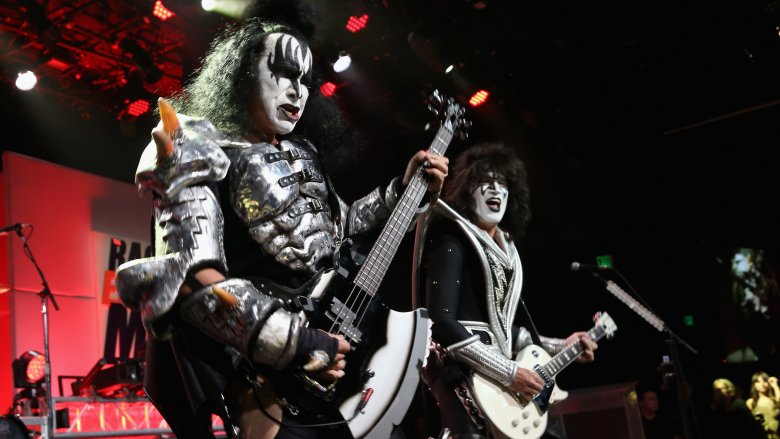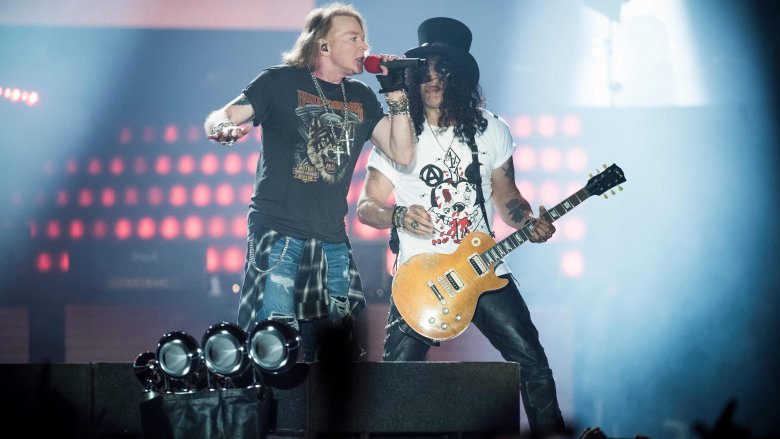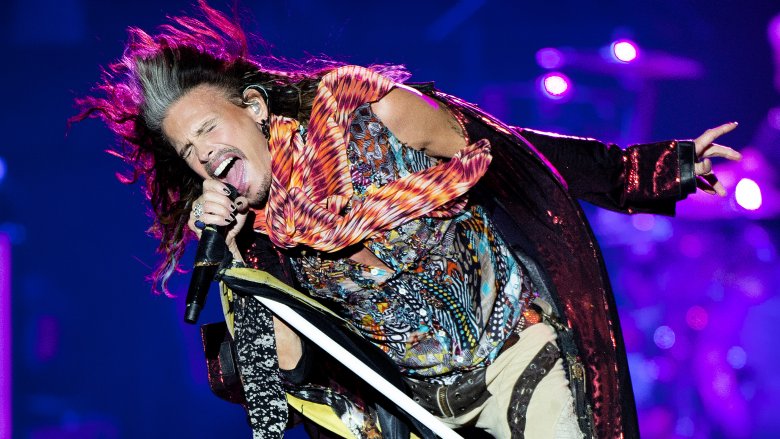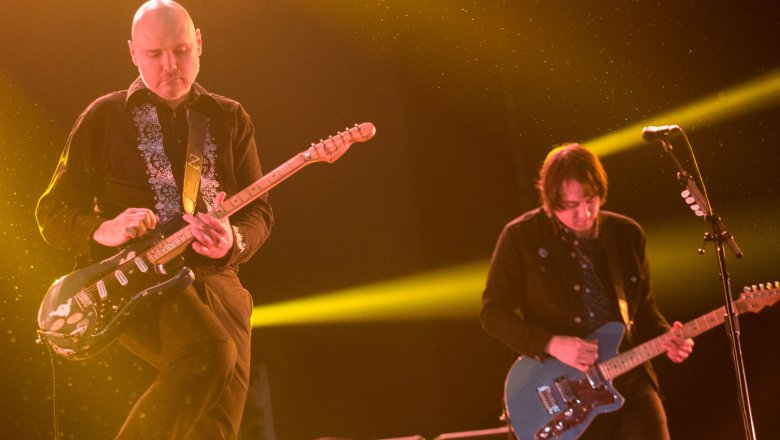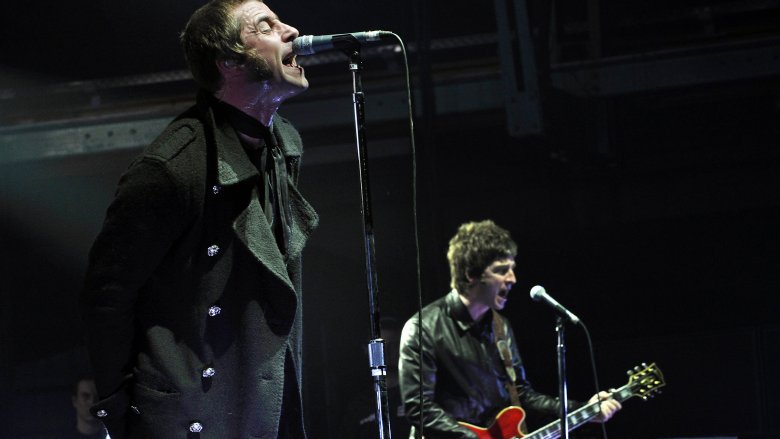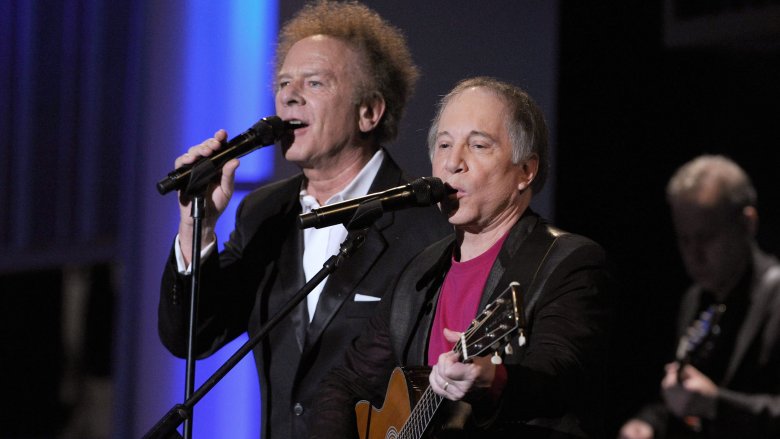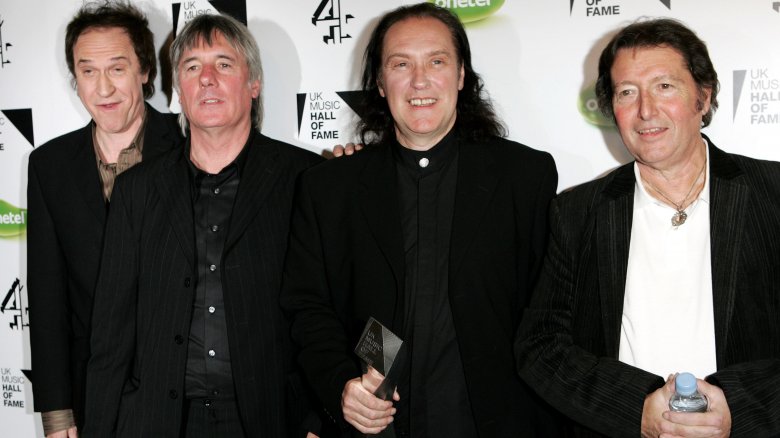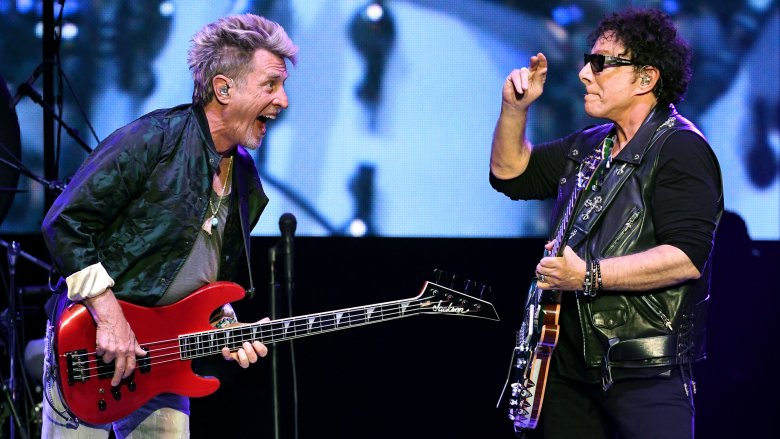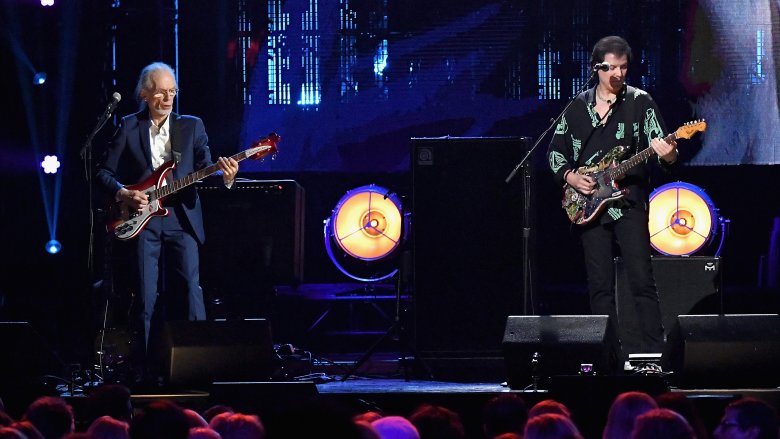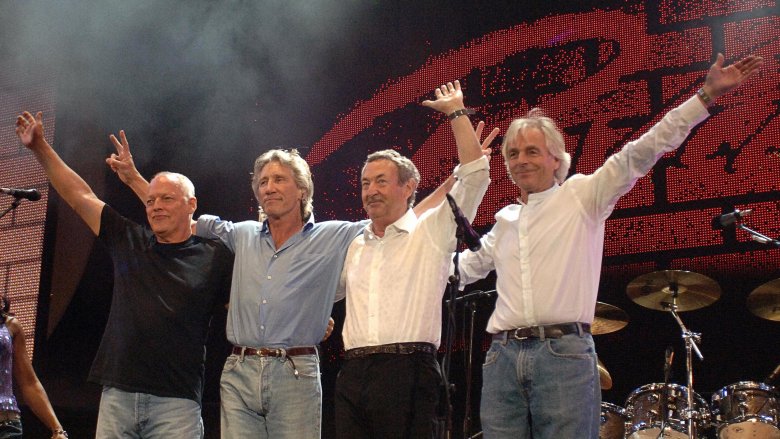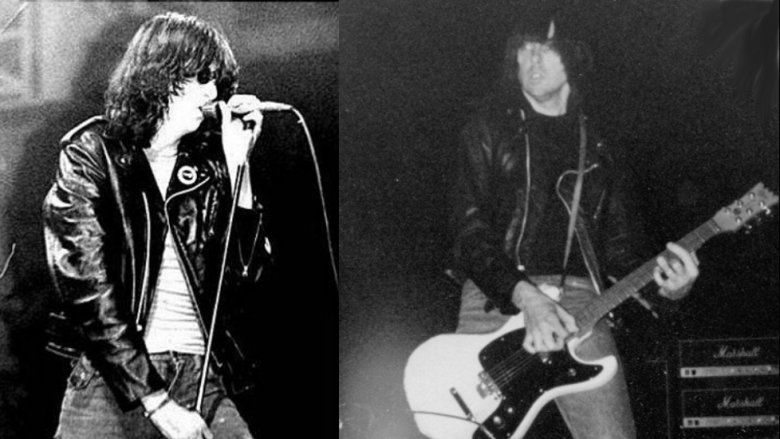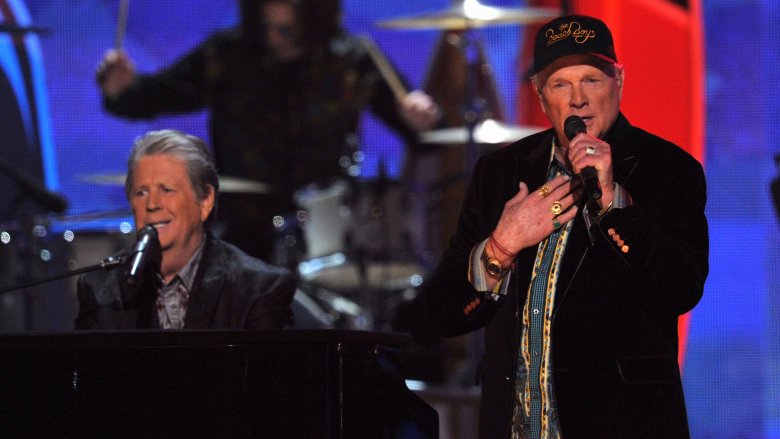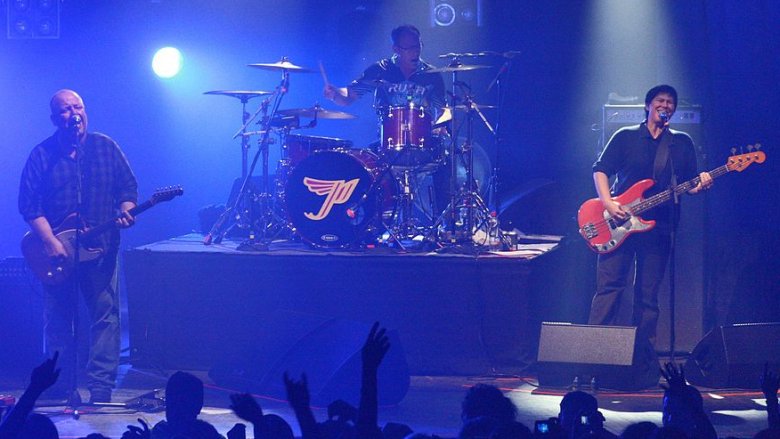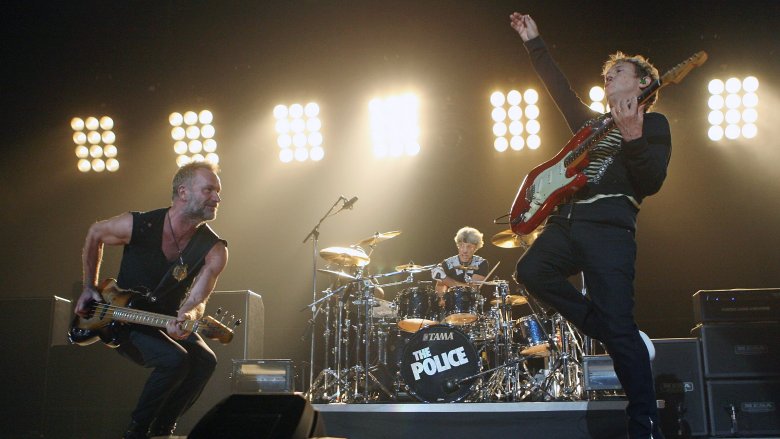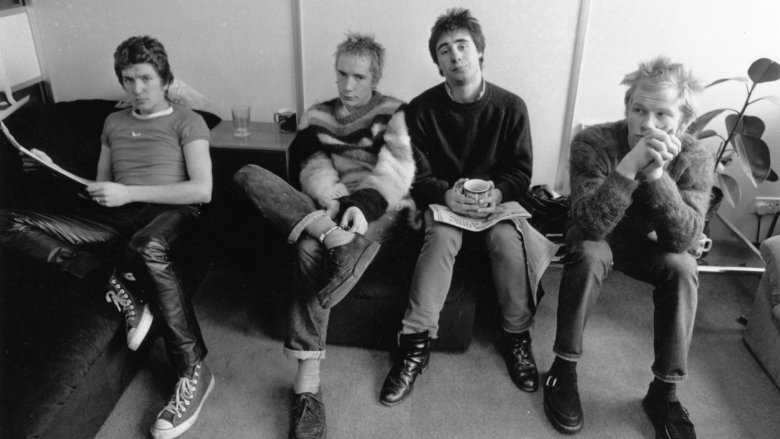Bandmates Who Hate Each Other
Just because bands get onstage and rock out doesn't mean everything about their relationship rocks. In fact, some of the biggest, greatest, most popular musical acts in the world spend just as much time squabbling among themselves as they do shredding solos and pounding on drums.
KISS
Currently, two original members of KISS — Ace Frehley and Peter Criss — are on the outs with the group, with their makeup being occupied by two hired guns. Frehley and Criss left in the early '80s and, apart from a brief nostalgia-fueled reunion in the late '90s, have stayed away ever since. In response, Gene Simmons and Paul Stanley have disparaged both their estranged bandmates, with Simmons claiming (according to a CBS interview with Stanley) that the two aren't "fit to wear the makeup anymore." Stanley agreed, saying they don't deserve to be in the band and that he didn't want to perform with them during their Rock & Roll Hall of Fame induction. Stanley went one step further in his 2014 autobiography, claiming that Frehley and Criss are anti-Semitic (Stanley and Simmons are Jewish), that Frehley collected Nazi memorabilia, and that Criss was racist against Asians. He also called Simmons an egomaniac who wasn't actually a marketing genius, but that pales in comparison to "you are basically Nazis."
Frehley fired back in a 2014 Vice interview, saying the anti-Semitic claims are bogus, that Paul and Gene hate him because he was a drug addict, that he's been clean for years but they still won't forgive him, and that they tried to severely low-ball him to appear in a KISS documentary. Although they got along real well when entering the Hall of Fame, it's clear that was as much an act as wearing face paint and calling yourself "Starchild."
Blink-182
Blink-182 has a reputation as a fun band, the kind to go streaking in one video and to mildly rib boy bands in the next. But apparently there's some real turmoil behind the wacky, poop-joke-loving trio, which isn't likely to go away anytime soon.
According to guitarist Tom DeLonge's January 2015 Facebook note, his relationship with Blink is "poisoned." DeLonge left Blink in 2005 and returned in 2009, but by 2015 the old feelings of animosity came back. The band attempted to record an EP — DeLonge claims he was in the studio for two months putting it together, while Travis Barker and Mark Hoppus put in a mere 11 days' work. The band's "squabbling and politics" forced them to shelve the EP, which apparently devastated DeLonge. Then came a contract Barker and Hoppus wanted DeLonge to sign, one that stipulated he couldn't do anything with his other band, Angels and Airwaves, for nine months because the new Blink album was to be completed in six. That's an insane turnaround time for a functional band, never mind one whose bandmates were barely speaking. DeLonge didn't sign and left the band to be replaced by somebody else.
Barker, meanwhile, told Rolling Stone DeLonge was "disrespectful and ungrateful" and claimed he had his manager inform the band he was leaving, rather than do it himself. He then stuck the final dagger, saying, "why Blink even got back together in the first place is questionable." Damn — why can't these guys just go back to not acting their age?
Kings of Leon
Kings of Leon hasn't been around as long as some of the other bands that can't stop fighting, but they still manage to fight quite a bit. The main culprit appears to be an old enemy of humanity: alcohol.
As reported by The Telegraph, Kings frontman Caleb Followill had quite the alcohol issue — he was already drinking when the band broke big with "Sex on Fire," and by 2010 he claimed to be sober "for the first 30 minutes of every day" and nothing more. That kind of nonsense can't last, and it came to a head in July 2011. According to Rolling Stone, Followill was drunk and angry during a show. He blurted out to the crowd a plan to go backstage, vomit, drink another beer, then return and play a few more songs. He managed everything except the songs — Kings canceled the rest of the tour, but not before band member and brother Jared Followill implored the crowd to "f**king hate Caleb, not us." Apparently, that line set Caleb off even more, and he flew off to New York, considering leaving the band entirely.
A few days of non-speaking later, his brothers met up with him and, depending on who you talk to, either forced Caleb to rehab or didn't. Either way, he stopped overdrinking. After a brief hiatus, the band was back with a new album in 2013. They sold the reunion with interviews like the one with The Telegraph, insisting they don't fight anymore. It's never a good sign when the selling point of a tour is "hey, we probably don't want to kill each other now!"
Guns N' Roses
Guns N' Roses' epic problems began in the early '90s, but for a while, nobody knew for sure why Axl Rose and Slash hated each other so. It just seemed like a raging case of creative differences with a side order of massive egotism. According to GNR's old road manager, the feud can be boiled down to Michael Jackson, of all people.
In an interview with Rolling Stone Brazil (recapped in English by AOL), Doug Goldstein revealed that, after Slash agreed to play guitar on Jackson's new song "Black or White," Axl hit the roof. Axl was allegedly molested by his father as a child, and even though Jackson had yet to be investigated for child molestation, rumors were flying and Axl apparently believed them. Then, when Slash reportedly admitted he was getting paid with a flat-screen TV, that "devastated" Rose beyond repair. Their relationship withered, and by 1993 GNR had come to a screeching halt.
Axl and Slash only buried the hatchet recently, with a reunion tour that kicked off in 2016. But as City Pages pointed out when reviewing one of its shows, "you don't need to like each other to rock out." Chances are, these two aren't drinking beer together after shows and probably never will again. But as long as they can bang out "Paradise City" night after night, fans will happily pay.
Aerosmith
Joe Perry and Steven Tyler of Aerosmith rock best when they're together, except they're almost certainly happier apart. In his autobiography, Rocks: My Life In and Out of Aerosmith, Perry details several incidents where Tyler's antics have driven him up a wall.
The basic issue, according to Perry, is that he and the band are in it for the music, while Tyler's in it for fame and women. That kind of creative tension often proved too much, judging by how Perry outright quit the band in the early '80s. In addition, Perry cringes at Tyler's attempts to go into business for himself, like attempting to get more money for himself from licensing Aerosmith songs for Guitar Hero or judging on American Idol (without telling the band first) or doing fewer collaborations with Perry and more with other, less-rocking songwriters. (Diane Warren, anyone?) That said, the New York Daily News' review of the book does mention Perry still respects and, sometimes, even gets along with Tyler. It's a start.
Tyler, meanwhile, isn't a huge fan of Perry either. In his autobiography, Does the Music In My Head Bother You? Tyler claims Perry is aloof and almost completely lacking in sweet emotion. As he claims Perry once told him, "Just because we're in a band together doesn't mean we have to be friends." So basically, Perry and Tyler are two Employees of the Month who keep the company thriving, even though they all but choke one another in the break room every day.
Smashing Pumpkins
Various members of Smashing Pumpkins have been fighting with each almost since the band began, and how they ever managed to get back together is a modern miracle. According to a 1995 Us Weekly article about the band, there's been strife for years, starting with guitarist James Iha and bassist D'arcy Wretzky becoming a couple and then breaking up during the recording of their debut album, Gish. Then there's Billy Corgan's knack for almost seeing the band as a glorified solo project — for their second album, Siamese Dream, he did most of the interviews and played most of the guitar and bass, despite having both a guitarist and bassist.
By 2000, after tons of squabbling and roster changes, the Pumpkins disbanded. According to E! News, Corgan tried to paint the band in a different light, saying "There's nothing wrong inside the band, but the way the culture is and stuff, it's hard to keep trying to fight the good fight against the Britneys." Meanwhile, plenty of other bands survived against pop music just fine, so more than likely Corgan wasn't telling us something.
In 2015, Corgan reunited with long-time drummer Jimmy Chamberlin for some shows, but that only lasted about as long as any collab with Corgan possibly could. In February 2018, the band announced a reunion tour but without the bassist, D'arcy Wretzky, and whether for her or because everyone was tired of the fighting, the tickets aren't exactly flying off the shelves.
Oasis
Few bands are defined by their squabbling more than Oasis. Brothers Liam and Noel Gallagher were seemingly always spatting at each other — as Noel told ABC in 2000, "It was just drunken, f**king nonsense. ... It's just two brothers in a band who have strong opinions about how things within that band should be."
Well, those drunken opinions got stronger and stronger, until the band — and the brothers' relationship — combusted entirely in 2009. As Noel described it during a 2011 press conference, arguments arose over whether Liam missed a gig because of laryngitis, or because he was hungover. Fruit was thrown, guitars were swung like axes, and Noel finally decided he had had enough of the band, and his brother.
According to the tabloid Metro, the Oasis implosion was always inevitable. As early as 1994, their so-called "Wibbling Rivalry" had dominated the band, with choice words from Liam like "I f**kin' hate that t**t there. ... I hope one day ... I can smash [the] f**k out of him, with a f**kin” Rickenbacker, right on his nose, and then he does the same to me." He also keeps calling his brother a "potato" on social media, and Noel stated in 2005 that Liam's "actually frightened to death of me. I can read him and I can f**king play him like a slightly disused arcade game." Hopefully Mama Oasis is used to family dinners without the entire family around.
Van Halen
The most memorable Van Halen lineup — Eddie and Alex Van Halen, David Lee Roth, and Michael Anthony — haven't been a thing for a long time. And the way things are going between those four, don't expect a full reunion anytime soon.
There's no issue between Eddie and Alex — they're brothers, best friends and love each other. But Roth and Eddie have more than a few issues, stemming largely from how poorly Eddie judges Roth's character. As Eddie told Billboard, "Roth's perception of himself is different than who he is in reality. We're not in our 20s anymore. We're in our 60s. Act like you're 60." So basically, Eddie sees Roth as a giant man-child, and embarrassing stunts like his camera-hogging and mugging at the 1996 MTV Video Music Awards didn't help matters. In that same interview, Eddie claimed that Roth doesn't want to be friends, and that seems to suit Eddie just fine.
He has worse things to say about ex-bassist Michael Anthony, whom he claims can't play bass ("Every note Mike ever played, I had to show him. ... He'd come over with a video camera and I'd have to show him how to play all the parts,") and can't sing ("Mike's voice is like a piccolo trumpet. But he's not a singer.") So while he may tour with Roth, though they can barely stand each other, he'd sooner hire a bass fish than let Anthony play bass again.
Simon and Garfunkel
Since splitting in 1970, Paul Simon and Art Garfunkel have reunited a handful of times, and it never lasts because the two can barely stand one another. The tiffs began almost immediately, when the pair recorded an album and Simon, instead of promoting it, jetted off to England to record his own solo material. Then there was the time both men vetoed each others' suggestion for the 12th song on Bridge Over Troubled Water — the album was released with 11 songs because heaven forbid an album have 13 tunes. After that, the duo called it quits.
Since then, we've heard everything from swipes (In a 2015 Telegraph interview, Garfunkel claimed he had "created a monster" in Simon, and called him a "jerk" for breaking up the duo so quickly), and petty jabs (Simon admitted in 1982 he had inserted "so long already, Artie!" into the fade of "So Long Frank Lloyd Wright," which isn't a jerk move at all), to outright dismissal (after Garfunkel suffered vocal cord problems in 2010, Simon told the BBC he "would just as soon not go back and visit the past." You'll notice most of the hostility seems to come from Simon's camp — if Garfunkel had his way, the duo would've never broken up, save for a break every now and again. But Rhymin' Simon makes the rules, much to the chagrin of everyone who loves to hear them harmonize.
The Kinks
Oasis has its sibling rivalry, but the Kinks did it first. Ray and Dave Davies have been at each others' throats for decades now and, by this point, it's likely to never get better.
The two have been going at it since childhood — as Dave said in a Telegraph interview, "I think Ray has only been happy for three years of his life ... the three before I was born." Years of back-and-forth arguments did their best to overshadow the band's amazing catalog of songs, until it killed the band in 1996. Over 20 years later, the band has yet to reform, and the brothers' relationship is stone cold at best. Shortly after the breakup, the two reunited for Dave's 50th birthday. But according to Dave, Ray made it all about him: "Just as I was about to cut the cake, Ray jumped on the table and made a speech about how wonderful he was, and then stamped on the cake." As we all know, you don't mess with somebody's cake, and the two have been estranged ever since.
Will there be a reunion? That depends on when you ask Dave. In 2010, he seemed open to one, telling Rolling Stone it was "possible" but "it's all water under the bridge now." But just four months later, when asked the same question by the Daily Mirror, he was less "maybe" and more "hell no." "Ray's an a**hole ... sucks me dry of ideas, emotions, and creativity," he said, also calling him "toxic" and a "control freak." Sadly, the more emphatic answer is likely the real one.
Journey
We've already documented Steve Perry's issues with Journey — in a nutshell, Perry grew tired of the band, left, and claimed he never felt like he was truly in the band. Then Journey replaced him with a soundalike and performed sans Perry at their Hall of Fame induction, though he did attend.
But now, other members of Journey have issues with one another, and it's threatening the band as a whole. As documented by Ultimate Classic Rock, guitarist Neal Schon and keyboardist Jonathan Cain have been feuding over the band's artistic direction. According to Cain, Schon wanted to do a hard rock record, and the result — 2011's Eclipse — didn't do all that hot. Cain feels they should never go that route again, but since Schon feels like he's the main member of the band, he believes Cain should quit undermining him. As he said on Instagram "I want to be elevated by whom I play with, not feel like I've got cement shoes. If anyone is unhappy they are not running my band, then they should leave."
If that's not enough, Cain has been doing religious music on the side ever since marrying a minister. Schon has issues with that as well, fearing religious and political slants (Cain's wife spoke at Donald Trump's inauguration) could compromise the band. Hopefully if Cain goes, they find another keyboardist who plays exactly like him.
Yes
What's better than one Yes? How about two Yeses? That's what's currently happening, thanks to one founding member's desire to keep on Yesing, despite Yes saying "no" to bringing him back.
According to the San Diego Union-Tribune, in 2008 original singer Jon Anderson left the band due to health issues. Rather than wait for him,the rest of Yes found a tribute singer named Benoit David and kept on touring. Angered, Anderson recruited two other ex-members of Yes — guitarist Trevor Rabin and keyboardist Rick Wakeman — and formed a group called ARW (the first initials of each of their last names). However, in 2017, they decided they'd fare much better with a familiar band name, so they changed it to "Yes, Featuring Anderson, Rabin, and Wakeman." And you thought "Sublime With Rome" was an awkward moniker.
YWARW explained themselves with "The fans want it, we want it, and it's our right to use the name. YES music is in our DNA!" It's unclear how Yes music is any different than ARW music simply because of a name change, but we can't all understand the minds of rock stars. Original Yes responded with a press release saying, "While Jon Anderson has rights to use the name as one of the co-owners of the trademark, Yes' position is that every effort should be made by ... all involved to respect Yes' magnificent and loyal fan base and minimize confusion." In other words, "You're technically right, but come on, guy."
Still at loggerheads
Bandmates end up hating each other for various reasons, but one of the most insurmountable reasons is ego. Sometimes, bandmates just can't ever get along, because according to the law of egos, two equally enormous egos can't occupy the same space.
That appears to be the gist of the trouble between Pink Floyd members David Gilmour and Roger Waters, at least according to the observations of drummer Nick Mason. "I think it's really disappointing that these rather elderly gentlemen are still at loggerheads," he told Rolling Stone. "I think the problem is Roger doesn't really respect David. He feels that writing is everything, and that guitar playing and the singing are something that, I won't say anyone can do, but that everything should be judged on the writing rather than the playing."
Waters left Pink Floyd in 1985, and Mason says he thinks Waters is still "rankled" that the band survived without him. Waters and Gilmour reunited for a set at Live 8 in 2005, and again five years later at a U.K. benefit show, but the two haven't been seen together in public since 2011.
Mason is a lot more optimistic than most of the rest of us are. "I live in hope," he said. "I mean, I don't think we're ever going to tour as Pink Floyd again. But it would seem silly at this stage of our lives to still be fighting."
Johnny Ramone took his baby away
You probably thought that "The KKK Took My Baby Away" was actually about the KKK taking Joey Ramone's baby away. Well, according to a popular punk rock legend, the KKK was actually (metaphorically) Johnny Ramone, and, "my baby" was Joey's girlfriend Linda, who left him for "Republican-leaning" Johnny. Alas, though, Rolling Stone says the story is just lore, and Joey wrote the song years earlier — though we like to think he might have at least directed it at Johnny a time or two.
Whatever you believe about the legend, Johnny really did steal Joey's girlfriend, and the Guardian says the two never spoke again, even though the band continued to tour for more than a decade and a half. That's some pretty deep-seated hatred, and it went on until after Joey's death from lymphatic cancer in 2001. One writer described Johnny's demeanor about his former bandmate's relatively recent death as "non-affected nonchalance."
There was more than just the love triangle, though. Rolling Stone says Johnny Ramone had an "iron hand," though that's really an unnecessarily kind way of saying he was abusive. He was physically violent with his bandmates (and his then-girlfriend, too) for what he saw as major indiscretions, like playing a B-major instead of a C-minor. Manager Danny Fields once described standing outside the dressing room listening to "glass shattering and bodies slamming into walls." So really, Johnny didn't have the sort of temperament that made people feel friendly toward him.
Angry division
New Order was basically the soundtrack for an entire decade, famous for its kick drums and distinctive bass lines, and yet off stage the group was pretty much the opposite of the cohesive, music-making machine they were on stage. In an interview with Getintothis, former bassist Peter Hook said the band was pretty good at putting aside their differences to make music. "Anyone watching it would think, 'Oh my god look at them, they've got everything. They've got success, they're feted, what a wonderful world' and yet really we f*cking hated each other."
Unfortunately those negative feelings went beyond just being grumbly old men and all the way to court, when Hook accused his former bandmates of "clandestinely" trying to control not just the New Order trademark, but also the Joy Division trademark (the band's earlier incarnation with late frontman Ian Curtis). Hook also said the band, which he'd left in 2008, owed him "millions of pounds" in unpaid royalties. Hook's former bandmates, though, said the dispute was about Hook's royalties from the work the band had done after his departure.
The lawsuit was settled in 2017, but the animosity never went away. "He left the band, and then he complained about leaving the band," said singer/guitarist Bernard Sumner. "He's so angry. If you choose to take a path in life, don't blame other people for the path you've chosen to take."
Don't eff with the formula
You'd never know, based on those happy, optimistic lyrics, that the Beach Boys were not all about waxing down their surfboards on that long summer surfari. In fact, according to Brain Sharper, the Beach Boys had insurmountable creative differences, mostly between Brian Wilson and Mike Love — the former thought the band's sound needed upgrading, the latter thought there was no reason to "f*** with the formula." (Incidentally, the "don't f*** with the formula" quote that's been attributed to Love since the beginning of rock and roll time is evidently another not-based-on-reality piece of rock and roll lore. "It's the most famous thing I've ever said, even though I never said it," he wrote in his autobiography Good Vibrations: My Life as a Beach Boy.)
Anyway, like all epic feuds, there was more to the rift between Wilson and Love than just basic creative differences. Love also didn't agree with the fact that Wilson pretty much commandeered all the vocals, even though Love was a perfectly capable singer. There was also a pretty big difference in lifestyles — Love once recalled a time when the Wilsons wanted the whole band to try heroin together, an activity that didn't appeal to him or other members of the group. And there was the usual "I got cheated on my royalties" part of the fued, which appears to exist in the background of a fat percentage of all bandmate disagreements. So much for good vibrations.
A road trip would have fixed everything
Really, when you think about it, just about all of your problems can be blamed on the older generation. You're neurotic because your parents made you that way. The world is getting hotter because the older generation didn't think they had to worry about carbon dioxide. And the Pixies broke up because their elders didn't give them a stern talking-to.
That's what frontman Black Francis told Q, anyway. "We would have survived if we could have just stopped the train and taken a f*cking vacation. The people around us who were older should have seen that."
Ultimately, though, the band split in 1993 in part because of the rift between Francis and bassist Kim Deal. "Kim and I just didn't get along well after a time," Francis said. "She always had her own ambitions and became comfortable in a leadership role in her other band [The Breeders]. It must have been hard for her to be in a band where some other guy was always pulling at the reins."
That's a very diplomatic statement, really, since for years rumor has held that the relationship between Francis and Deal wasn't just "hard," but hateful to the point that Francis once threw a guitar at Deal during a gig in Stuttgart. That sounds like a little more than just "didn't get along well." But hey, rock and roll, baby.
Sparky chemistry
You don't use the word "surviving" in the title of the documentary of your life unless you truly think you lived through something. Andy Summers' biographical film Can't Stand Losing You: Surviving the Police documents the "mind-warping few years" he spent as the guitarist for The Police. And yet, despite the rather melodramatic title, Summers insists that the band's breakup was more about burnout than about the personal relationship between band members. "People say we hated each other," he told an audience at Laemmle's Playhouse in Pasadena. "We were feisty. You need to have sparky chemistry. Everyone wanted to be the leader, everyone wanted to be up front."
"Sparky chemistry" is yet another diplomatic way of saying that bandmates fought — a lot. By the time they started working on Synchronicity, their fifth LP, things were pretty rough. "Sting and Stewart hated each other," Producer Hugh Padgham told Sound on Sound. "And although Andy didn't show as much venom, he could be quite grumpy, and there were both verbal and physical fights in the studio ... I'd try to be Mr. Producer and get in the way, saying, 'Come on, do you have to kick the sh*t out of one another?' but they'd just turn around and shout, 'Get out of it! What do you know?'" Sparky chemistry, indeed.
Money overcomes all differences
The cool thing about punk rock is that no one really expects you to play nice. When you have songs like "No Feelings" and "Anarchy in the U.K.," and also your name is "Johnny Rotten," people sort of expect you to be a jerk. Which by default means you probably don't get along with people.
According to Ultimate Classic Rock, the Sex Pistols finished their first and only tour of the U.S. in January 1978, long after the death of bassist Sid Vicious and, according to a lot of observers, long after the death of the Sex Pistols, too. After that mediocre American tour, Johnny Rotten left the band. They didn't reunite until 1996, almost two decades later.
Rotten didn't bother with all the diplomacy and niceties that we've seen in other bands, though. "We still hate each other with a vengeance," he said at a press conference. "But we've found a common cause, and that's your money."
Animosity among bandmates evidently even goes beyond the grave — Rotten didn't have anything nice to say about the late Sid Vicious, either. "Sid was nothing more than an empty coat hanger to fill an empty spot on stage," he said.
Since that reunion in 1996, the Sex Pistols have toured a couple more times, and Rotten told Rolling Stone he'd be open to future reunions, too. So at least in the case of the Sex Pistols, hatred can be overcome. If only by money, but whatever. Now that's punk.
